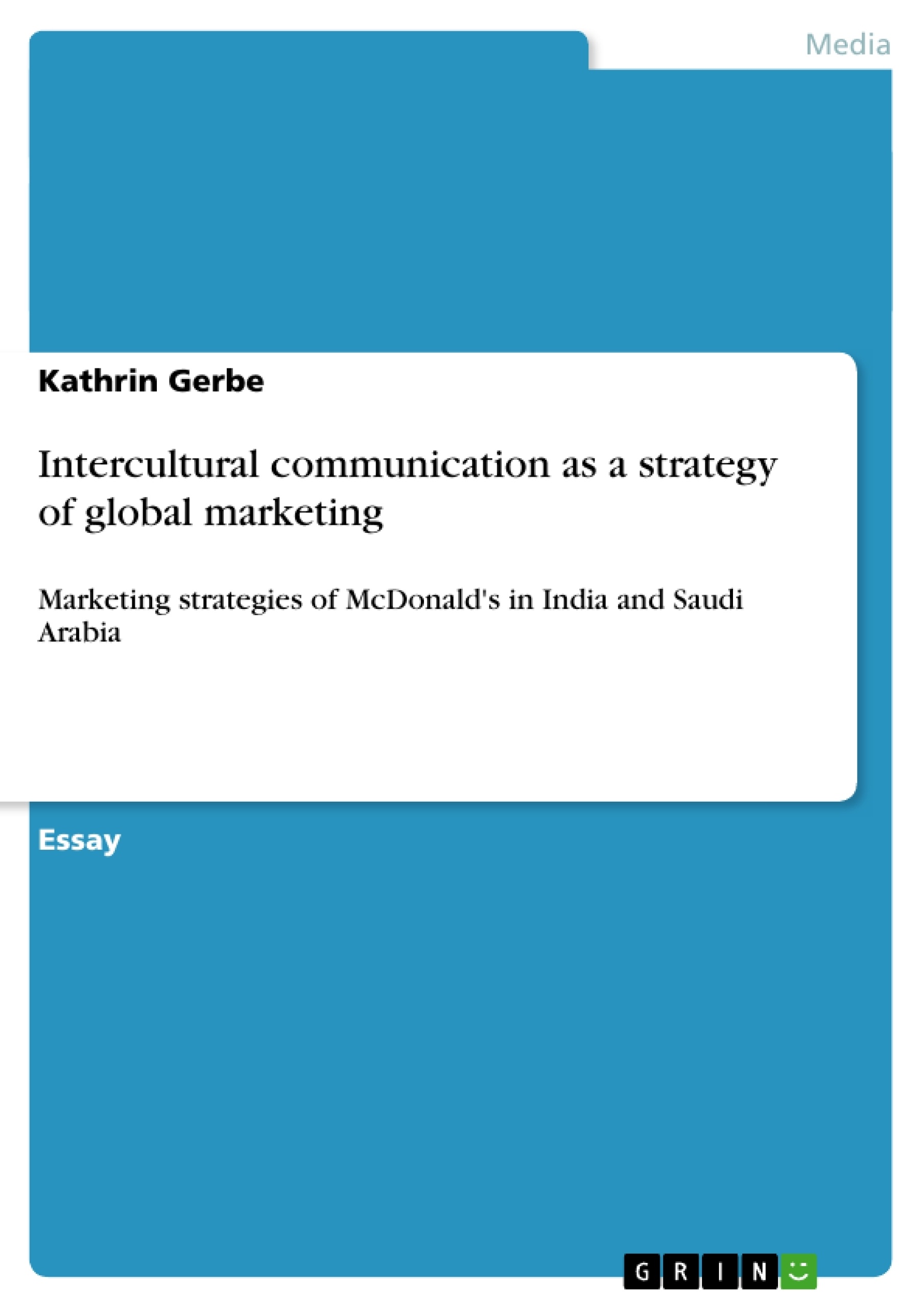The world is growing together. In the wake of globalization many companies have expanded their markets to countries around the world. No matter if in Europe, America, Africa, Asia or Australia – everywhere we are greeted by the familiar corporate logos of global players like Coca Cola, McDonald’s and Burger King.
I would like to suggest that an important factor of the international success of these companies are specialised marketing concepts, which are based on the individual culture of the respective target country. Intercultural communication seems therefore an important element in marketing products worldwide.
In this essay, I will have a look at a company whose name has become synonymous with globalization: McDonald's. The development of the term “McDonaldization” shows that the company’s strategy of efficiency, calculability, predictability and control is effective around the globe (Ritzer in Usunier 2000; Jandt 2004).
Inhaltsverzeichnis (Table of Contents)
- Introduction
- Theory
- Culture & Intercultural Communication
- Marketing and International Marketing
- Problems in Marketing Communication
- Case Studies
- Case Study I – Marketing McDonald's in India
- Products
- Pricing
- Promotion
- Place / Distribution
- Case Study II – Marketing McDonald's in Saudi Arabia
- Products
- Promotion
- Place / Distribution
- Case Study I – Marketing McDonald's in India
Zielsetzung und Themenschwerpunkte (Objectives and Key Themes)
This essay explores the role of intercultural communication (ICC) in understanding and developing successful overseas marketing strategies for companies, particularly focusing on McDonald's in India and Saudi Arabia. The essay aims to demonstrate how ICC can contribute to practical solutions in achieving core business goals by analyzing the company's adaptation of its marketing mix in these two countries.
- The importance of cultural awareness in international marketing.
- The impact of cultural differences on consumer behavior and preferences.
- The role of ICC in adapting products, pricing, promotion, and distribution strategies to specific cultural contexts.
- The effectiveness of McDonald's adaptation of its marketing mix in India and Saudi Arabia.
- The potential challenges and opportunities of globalization and intercultural communication in business.
Zusammenfassung der Kapitel (Chapter Summaries)
- Introduction: The essay sets the context of globalization and the growing presence of international companies like McDonald's. It introduces the concept of intercultural communication as a key factor in international marketing success.
- Theory: This chapter defines key concepts related to culture, intercultural communication, marketing, and international marketing. It emphasizes the importance of understanding cultural differences and their impact on communication and consumer behavior.
- Case Studies: This section delves into McDonald's marketing strategies in India and Saudi Arabia, examining the adaptations made to the core marketing mix (product, price, promotion, and place) and the rationale behind these changes.
Schlüsselwörter (Keywords)
The key concepts and terms explored in this essay include intercultural communication, international marketing, globalization, cultural awareness, marketing mix, product adaptation, pricing strategies, promotional campaigns, and distribution channels. The essay focuses on the intersection of these concepts and their application in the case of McDonald's global marketing efforts.
Frequently Asked Questions
Why is intercultural communication (ICC) important in marketing?
ICC is crucial for understanding local cultures, consumer behavior, and preferences, allowing companies to adapt their marketing mix to be effective in different global markets.
What is "McDonaldization"?
It refers to the company's global strategy focused on efficiency, calculability, predictability, and control, which has become a synonym for globalization.
How did McDonald's adapt its marketing mix in India?
McDonald's adapted its products (e.g., no beef), pricing, promotion, and distribution to align with Indian cultural and dietary norms.
What cultural considerations were made for McDonald's in Saudi Arabia?
Adaptations were made to products, promotional materials, and the physical layout of locations (place/distribution) to respect local religious and social customs.
What are the key elements of the marketing mix analyzed?
The analysis focuses on the 4Ps: Product, Price, Promotion, and Place (Distribution).
- Citar trabajo
- BA, MA Kathrin Gerbe (Autor), 2007, Intercultural communication as a strategy of global marketing, Múnich, GRIN Verlag, https://www.grin.com/document/75177



